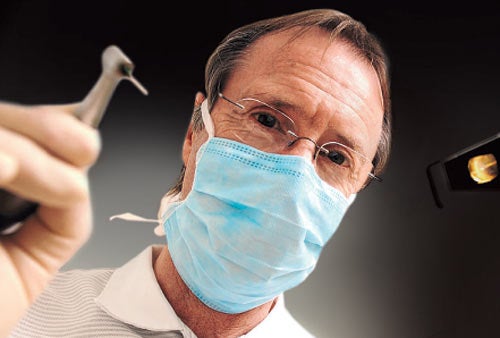The great dentistry rip-off: time to bite back

In the first sign that consumers are starting to hit back against soaring dental fees and unscrupulous practitioners, hundreds of patients have won refunds worth thousands of pounds for treatment that failed.
Private dentists who overcharged patients and performed shoddy dental work have paid out more than £100,000 in compensation in the first year of operation of a new complaints service, The Independent can reveal. The payouts were listed in the first report by the Dental Complaints Service (DCS), a body set up in May 2006 in response to evidence of widespread patient dissatisfaction.
More than 1,600 patients complained to the service in the year to May 2007 and were awarded £138,000 in refunded fees, an average of £86 per patient. But the vast majority of the millions of patients using private dentists still have no idea that a formal mechanism exists for complaints.
Consumer groups yesterday applauded the compensation payments but demanded that far more be done to publicise the system. Frances Blunden, health policy adviser at Which?, formerly the Consumers' Association, said that there was widespread concern about the cost of dental treatment in Britain. "Most people probably don't know about the DCS," she said. "We have done our best to publicise it. If people don't know about it they can't complain."
She added that NHS dentists were required to display details of NHS charges in their surgeries and private practitioners should do the same. "There ought to be a list of indicative charges displayed so private patients have an idea of whether they are consulting a more expensive or a less expensive dentist. It would make sense to include on it contact details for the DCS. But there is an innate resistance to this sort of thing among dentists."
A spokesman for the Department of Health said the Government lacked the power to compel private dentists to display details of prices or the DCS in their surgeries. "We are exploring whether we can tighten regulation of private dentistry under the Health and Social Care Bill," he said.
The top five areas of complaint to the DCS involved fillings, dentures, crowns, root canal treatments and bridges, and concerned excessive cost, pain being ignored, rudeness, lack of access to treatment and failure to obtain consent, according to its annual report published last month.
Three-quarters of cases were resolved in three days, on average. Only 16 complaints progressed to the final stage of the three-stage procedure, where they were decided by a three-member panel. Ten of the 16 were resolved in favour of the patient.
Hugh Smith, head of the DCS, said increasing awareness of the service was a top priority. "It is a major concern for me that people get to hear of us," he said. "If there are patients out there who have had private dental care they are not happy about, I very much hope they will apply to us. We are about helping patients and dentists to find a resolution quickly, with the fee refunded or a payment made for remedial work as appropriate.
"Most dentists want the opportunity to put things right – so referring the patient back to the practice works very well. Sometimes the complaints are about cost but cost tends to come into it when the treatment has gone wrong. It is up to dentists what they want to charge on the basis that it is agreed with the patient before treatment starts."
An inquiry by the Office of Fair Trading (OFT) estimated in 2003 that 10 million patients had received at least some private treatment and the growth in private work has since accelerated.
The DCS was set up following the OFT inquiry into private dentistry, triggered by a complaint from the Consumers' Association. The OFT report found huge variation in the fees charged, with some patients paying four times as much as others for the same treatment. The OFT said the price differences were difficult to justify and concluded "the market is not working well for consumers".
The total compensation paid out in 2007 is likely to be much higher because many patients settled their dispute direct with their dentist and were given a refund without the involvement of the DCS, after being advised what to do, a spokesman said.
The Independent revealed yesterday that dentists' NHS incomes plunged by 16 per cent, as a proportion of total earnings, between 1999-2000 and 2005-06, as private work grew. On Thursday, we reported that dentistry in England was the most expensive in Europe, according to a nine-country survey.
To contact the Dental Complaints Service, call 08456 120540, or go to www.dentalcomplaints.org.uk
Woman wins £3,800 for botched work
A private dentist in Littlehampton, West Sussex, charged Pam Alldis almost £4,000 for a new bridge. Within a year it had broken, and two attempts to create a replacement also failed. When she returned to seek further remedial work, she was shocked to discover her dentist had gone.
"The owner of the surgery told me my dentist had operated a separate practice within it and there was nothing he could do. He didn't tell me about the Dental Complaints Service. I only heard about that from the local hospital."
The DCS tracked Mrs Alldis's dentist down to a practice in Kent. After prolonged correspondence ... a payout of £3,800 was arranged for Mrs Alldis, which will go towards a set of false teeth.
Mrs Alldis, 62, of Bognor Regis, said: "The fees for dentists are bad enough without having to take them on. Lay people ... don't know where to go. If you get a bad dentist you are at their mercy. Without the DCS I wouldn't have had a hope."
Join our commenting forum
Join thought-provoking conversations, follow other Independent readers and see their replies
Comments
Bookmark popover
Removed from bookmarks